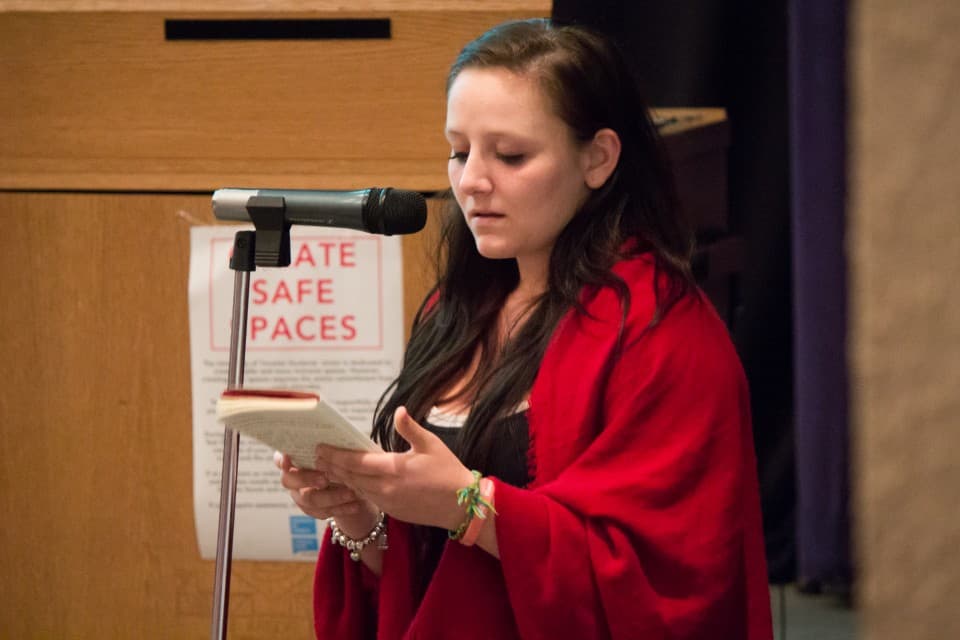October seventh saw a lengthy Annual General Meeting (AGM) of the University of Toronto Students’ Union (UTSU) that failed to produce the necessary board structure moving forward in order to comply with federal law. Narrow defeat was ultimately snatched from the jaws of victory, after one of the two competing proposals was elected for ratification. However, it ultimately failed to meet the required two-thirds majority vote by the union’s membership.
Following the packed meeting, the UTSU’s legal status remains unclear.
Legal status
The UTSU is a federally incorporated, not-for-profit organization. With the Canada Not-for-profit Corporations Act (CNCA) replacing the Canada Corporations Act, the union needs a new board structure in order to comply with the new rules and regulations of the act. There were two proposals on the agenda: one was moved by Arts & Science at-large director Khrystyna Zhuk and the other by former UTSU vice-president external Grayce Slobodian.
During the AGM, over half of the votes were in favour of selecting Zhuk’s board proposal over Slobodian’s; however, the vote to ratify Zhuk’s proposal did not meet the two-thirds majority requirement. As a result, the proposal did not pass.
Consequently, the UTSU is currently operating under a board structure that is not compliant with the CNCA. This has lead to concern that the union would dissolve.
Andrew Monkhouse, the UTSU’s legal counsel, reassured members at the meeting that the failure to ratify a board structure proposal would not lead to an immediate dissolution.
“There is not an immediate danger of the organization ceasing to exist or be dissolved,” said Monkhouse during the AGM. “We expect that the government would provide some notice to the organization prior to that happening.”
That being said, Monkhouse did stress the importance of eventually having a CNCA-compliant board structure.
“It’s a political discussion in terms of what by-laws you have that are in compliance with the CNCA, but you should eventually pass by-laws that are in compliance with the CNCA,” said Monkhouse.
Ben Coleman, UTSU president, echoed Monkhouse’s sentiments. “It is important to pass compliant bylaws as soon as possible, and we hope all members act constructively at our next meeting to make that happen.”
The UTSU plans to have a Special General Meeting (SGM) in the coming months where Zhuk’s proposal is expected to be re-introduced.
“The next steps are that we need to have another general meeting to pass a compliant board structure. Details about that will be posted to utsu.ca/agm as soon as possible,” said Coleman. “We are making sure to double-check the details about how to appropriately proceed.”
The vote
The proposal that Zhuk moved was referred to as Appendix A throughout the meeting, while Slobodian’s was referred to as Appendix B.
With 607 votes in favour of Appendix A, and 529 for Appendix B, the gathered membership elected to consider the board-endorsed Zhuk/Singh proposal for ratification. However, following the inclusion of several friendly amendments, the proposal failed to meet the two-thirds majority vote required and therefore did not pass, with 562 votes in favour of ratification and 455 votes against.
“There’s a lot of emotions right now,” said Zhuk after the meeting. “We’re happy we won the [board structure proposal] election, but frustrated we didn’t win the two-thirds vote. We’re tired and it’s been a really long process so it’s unfortunate we didn’t get the outcome that we wanted,” she added.
“If you looked around the room, three quarters [of students] were in favor of the proposal. In terms of the proposal itself, we have consulted with so many student groups. I cannot put that on my team because they literally put their blood, sweat, and tears into this proposal.” Zhuk continued.
She also stated that she will put the proposal to the SGM to take place in a few weeks’ time and hinted that it may be amended further before then.
Ryan Gomes, UTSU vice-president internal & services, said that he felt overwhelmed at the close of the meeting. “I don’t want to say I’m disappointed because I think over everything we have to respect our members when they speak. But I am disappointed because at the last AGM there wasn’t a lot of consultation,” he said, adding that Zhuk and Daman Singh, the seconder of Appendix A, consulted with the University of Toronto Mississauga Students’ Union (UTMSU) to ask what they could do to make sure the proposal would be accepted by UTM in the future.
“All I can say is I feel very demoralized because I thought that we had come to a solution I thought was good for everyone and it turns out that I was wrong.”
Gomes stated that, moving forward, he plans to take more of a hands-on approach. “There needs to be a lot of reconciliation between all the different groups on campus. A lot of different groups feel like they don’t want to talk to each other because they’re so ideologically apart. As a UTSU exec[utive] I need to place myself in a situation to bridge that gap because if we don’t bridge that gap, I am genuinely fearful for the long-term viability of this organization. If we’re not in compliance with the CNCA, we are going to be in trouble.”
The meeting adjourned shortly before 11:00 pm, before the remaining items on the agenda could be considered. These items include the receipt of the union’s audited financial statements, other by-law amendments, and member-submitted motions, two of which were submitted from the floor during the meeting.
This is not the first time that a meeting has adjourned prematurely; last year’s AGM ended in a similar fashion.
The remaining motions, unaddressed at the AGM, will carry over to the UTSU SGM, scheduled to take place later this year.
With files from Enxhi Kondi and Iris Robin.
This article has been updated from a previous version, published online the day of the AGM.


